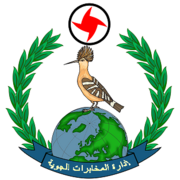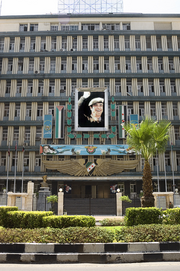Air Force Intelligence Directorate
This article is incomplete because it is pending further input from participants, or it is a work-in-progress by one author. Please comment on this article's talk page to share your input, comments and questions. Note: To contribute to this article, you may need to seek help from the author(s) of this page. |
| إدارة المخابرات الجوية Idaraat al-Mukhabarat al-Jawiyah | |
 Seal of the Mukhabarat. | |
 Headquarters building of the Mukhabarat. | |
| Agency overview | |
|---|---|
| Formed | December 10, 1927 |
| Headquarters | T1 Airbase, Tel al-Riyah |
| Motto | أَحَطتُ بِمَا لَمْ تُحِطْ بِهِ I have encompassed in knowledge that which you have not. (Al-Naml 27:22) |
| Employees | Est. 25,000 (2013) |
| Annual budget | Est. $4.7 billion (2013) |
Mission
Organization
Facilities
Budget
As with virtually everything tied to the Mukhabarat, its budget is a state secret. Details from leaked partner documents suggest that the Air Force Intelligence Directorate's budget in 2013 was around $4.76 billion, broken down into the following:
- Intelligence collection: $1.52 billion
- Intelligence processing: $0.62 billion
- Data analysis: $0.51 billion
- Research & technology:: $0.27 billion
- Clandestine operations: $0.50 billion
- Support and logistics: $1.44 billion
It is unclear how accurate these figures are, and if this includes foreign currency used for clandestine operations. Furthermore, as the Mukhabarat is suspected to be engaged in counterfeiting and cyber-attacks against enemy financial institutions, its official budget is not necessarily equal to the true amount of money available for its use.
Training and recruitment
Recruitment
Mukhabarat officers are recruited from the branches of the Riysian Armed Forces, primarily from the Riysian Arab Air Force and reconnaissance units of all branches, or are scouted out while they're still studying in a university. The former method used to be the most common way up until the 1980s, by picking out officers to service in field military intelligence units, and then from there inducting the best officers into the rest of the organization. However, with the digital revolution and an ever increasing need for highly specialized scientists and engineers, the latter is now the predominant method of recruiting officers into the Directorate. In either case, officers are selected based on their technical and analytical skills, as well as their political reliability.